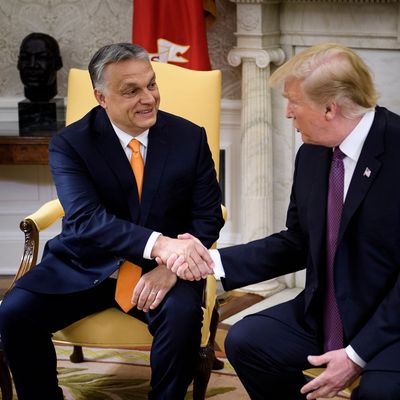
Imagine if President Bernie Sanders invited the left-wing Nicolás Maduro to the White House after previous administrations had shunned the Venezuelan strongman. Imagine Sanders then praised Maduro, not only as an ally to the United States but as a wise ruler, and compared Maduro to himself. Then you might begin to understand the chilling message delivered by President Trump through his friendly meeting with Hungarian president Viktor Orbán.
The darkest nightmare haunting liberals since Trump’s rise has been the specter of authoritarianism. The most plausible fear is not a sudden, fascistic crackdown but a gradual upward ratchet of the governing party’s hold on the political system — what political scientists call “democratic backsliding.” And when they cast about the globe for a model of democratic backsliding, the one that always seemed most frighteningly plausible was Hungary.
Hungary possessed the most salient traits of a future Trumpian dystopia. It was a well-functioning democracy hijacked by a right-wing party that gained power by seizing on ethnonationalist resentment and slowly strangling its opposition. The tools Orbán has used to build what he half-euphemistically calls “illiberal democracy” bear a certain eerie familiarity: an electoral system that gives Orbán’s rural base disproportionate clout, his intimidation of independent media and construction of a state news propaganda machine, and the relentless sowing of xenophobic fear.
American presidents have frequently made pragmatic alliances with foreign despots. But Trump has actually praised dictators for their brutality, a habit reflected in his comments going back decades and spanning such regimes as communist China, Saddam Hussein’s Iraq, North Korea, and Russia.
Trump’s ambassador to Hungary recently told Franklin Foer, “I can tell you, knowing the president for a good 25 or 30 years, that he would love to have the situation that Viktor Orbán has, but he doesn’t.”
If Trump had not numbed our sensibilities, his comments about Orbán would be shocking. He praised Orbán as a “tough man, but he is a respected man” — toughness being Trump’s way of praising the contempt for democratic niceties. And Trump endorsed not only Orbán’s foreign policy but his autocratic governing style. “Orbán has done a tremendous job in so many different ways, highly respected, respected all over Europe,” said Trump, adding that his counterpart was “probably, like me, a little bit controversial, but that’s okay. You’ve done a good job, and you’ve kept your country safe.”
Orbán’s naked sectarianism forms one of the underpinnings of his political style. He has demonized Muslim immigrants, rehabilitated his country’s anti-Semitic ancien régime, and turned George Soros, an obsessive hate figure among white supremacists, into a public fixation. In all these ways he has prefigured Trump’s own style.
Rather than put any distance between himself and Orbán, Trump singled out his sectarianism for special praise. “You have been great with respect to Christian communities,” Trump said in the Oval Office. “You have really put a bloc up, and we respect that very much.” There’s nothing wrong with helping Christians, of course, but Orbán’s political relationship with Christianity is pointedly directed against non-Christians.
The American foreign-policy apparatus has not been fully assimilated into Trump’s authoritarian worldview, and many of its members have either strained against the president’s impulses or deluded themselves about their nature. In the run-up to the meeting, news accounts emphasized that Trump would not necessarily reward Orbán with a fulsome endorsement. “White House advisers are cautioning Trump against a full embrace of Orbán, despite the president’s own affinity for the leader,” reported Politico. “Rather than a reward or an affirmation, the meeting can instead be framed as a carrot — an attempt to persuade Mr. Orbán to buy American weapons and give greater priority to American foreign-policy interests,” said the New York Times.
That Trump instead treated Orbán as an ideological comrade is deeply revealing. It is not a calculated foreign-policy maneuver but an expression of Trump’s worldview and still-forming domestic ambitions.
That Trump admires Orbán’s methods and would like to replicate them is not to say he will succeed. He is, among other things, far less knowledgeable and disciplined than his Hungarian counterpart. But there can hardly be any more question that what Orbán has done to his country, Trump aims to do to ours.






























